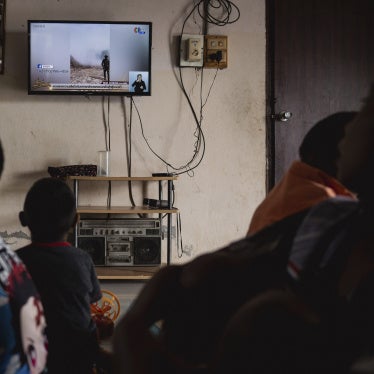(New York) - Human Rights Watch expressed its deep sorrow at the massive devastation and loss of life caused by the earthquake that hit areas of Pakistan and Pakistani and Indian-administered Kashmir on October 8. The organization extends condolences to the bereaved and sympathy to all those displaced and injured.
At least 30,000 people are thought to have died and some 70,000 injured. The death toll is expected to rise. As many as two million people have been displaced as a consequence of the earthquake. Relief efforts have been hampered by bad weather and scarcity of resources, particularly in Pakistan and Pakistan-administered Kashmir.
Many survivors now endure a desperate lack of shelter, food, water, essential medical services and sanitation. It is essential for the governments of India and Pakistan to support those engaged in humanitarian assistance and relief efforts and to welcome offers of support.
The greatest threat to human rights often arises in crisis situations. Human Rights Watch called on the governments of India and Pakistan to adhere to international human rights standards in the organization and provision of relief. Donors should be as generous as possible and make sure that they provide the right types of support in a timely manner.
In particular, Human Rights Watch highlighted the need to:
- respect principles of non-discrimination in the distribution of humanitarian assistance;
- ensure that persons are protected from discrimination based on their status as refugees from the ongoing conflict in Kashmir or displaced persons after the earthquake;
- protect the rights of all persons to freedom of movement, family unity and freedom from arbitrary detention; and
- ensure that the needs of the vulnerable, particularly women, children and the disabled, are adequately met.
Human Rights Watch called upon the governments of India and Pakistan to suspend traditional distrust at this time of crisis and immediately allow free and unfettered movement of humanitarian relief supplies and personnel, even if this requires access across the Line of Control. Human Rights Watch also called on the governments of India and Pakistan to ensure that aid organizations can assist all vulnerable populations according to their needs, and without political, ethnic, caste or religious bias. It is essential that both countries follow a coordinated approach to relief that allows aid to reach all parts of Kashmir through the quickest possible routes and means.
The first and only priority at this point is that suffering be eased and loss of life minimized for the people of Kashmir. The governments of India and Pakistan must extend to each other and accept all necessary assistance in order to ensure that this happens.








